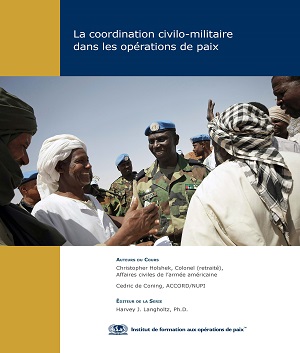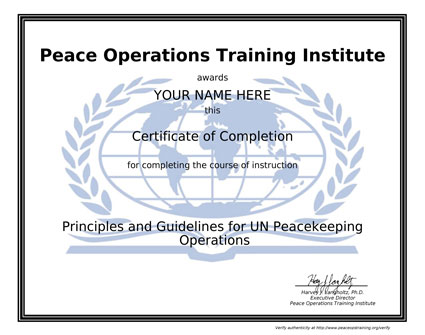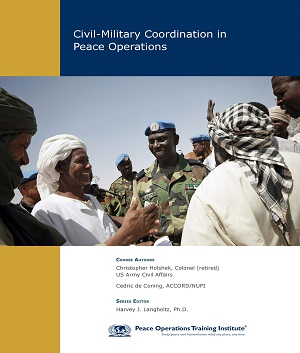La coordination civilo-militaire est le dialogue et l’interface entre les composantes militaires, civiles et policières d’une opération de paix concernant le domaine politique, sécuritaire, humanitaire, de développement et autres, en vue d’atteindre des objectifs politiques et stratégiques plus larges. Ce cours présente la théorie et la pratique de la coordination civilo-militaire dans le contexte des opérations de paix. La première partie du cours explique les concepts et principes de la coordination civilo-militaire au niveau général des opérations de paix des Nations Unies. La deuxième partie explore la déclinaison pratique de ces concepts aux niveaux opérationnel et tactique. La dernière leçon examine la coordination civilo-militaire en tant qu’exercice de leadership adaptatif et moyen de communication. Les acteurs de CIMIC de l’ONU figurent parmi les publics nombreux de ce cours, qui est également conçu pour les membres du personnel civil, policier et militaire — à la fois ONU et non-onusien — souhaitant mieux comprendre le concept de coordination civilo-militaire.
Ce cours s’appuie sur des précédentes versions et se fonde également sur les meilleures pratiques des différentes missions de terrain des Nations Unies, du service intégré de formation du Département des opérations de maintien de la paix, du Bureau de la coordination des affaires humanitaires (BCAH) et d’autres sources. Cette édition inclut la récente doctrine des Nations Unies, y compris le Rapport 2015 du Groupe indépendant de haut niveau chargé d’étudier les opérations de paix de l’ONU (le rapport HIPPO), le document Opérations de maintien de la paix des Nations Unies, Principes et orientations de 2008 et la Résolution 2086 du Conseil de sécurité des Nations Unies sur « l’approche multidimensionnelle du maintien de la paix ». Neuf leçons.
À propos de les auteurs : Christopher Holshek est agrégé supérieur auprès de l’Alliance pour le maintien de la paix et consultant pour la paix et la sécurité internationales spécialiste des relations civilo-militaires aux plans politique et pratique ainsi que de la formation et l’éducation civilo-militaire dans le cadre des opérations de paix. Colonel des affaires civiles de l’armée américaine à la retraite, il a trente ans d’expérience civilo-militaire aux niveaux stratégique, opérationnel et tactique dans des environnements conjoints, interinstitutions et multinationaux dans toute une gamme d’opérations.
Cedric de Coning est un chercheur collaborant avec ACCORD et l’Institut norvégien des affaires internationales (NUPI). Il a conçu et dispensé des formations en coordination civilo-militaire pour le DOMP, le BCAH, le PNUD et ACCORD. Il est l’auteur du manuel intitulé « Civil-Military Coordination in United Nations and African Peace Operations » (2007) et détient un doctorat en éthique appliquée du Département de philosophie de l’Université de Stellenbosch en Afrique du Sud.
Número de páginas: 329 [Francés]
Editorial: Instituto para Formación en Operaciones de Paz (POTI) [17-03-2017]


